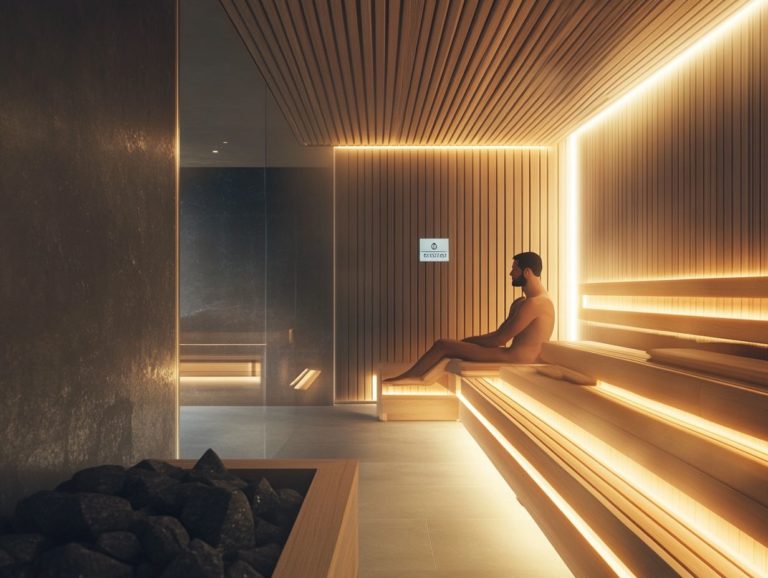Sauna Safety: The Role of Support Networks
Saunas have long been celebrated for their remarkable ability to relax and rejuvenate. They offer many physical and mental health benefits that can enhance your overall well-being.
However, it’s crucial to be mindful of the potential risks associated with sauna use, particularly for vulnerable groups such as children and the elderly. Discover the fantastic benefits of sauna use, the importance of establishing a safety plan, and the role of support networks in ensuring a safe sauna experience.
Explore with us to uncover everything you need to know for a safe and enjoyable sauna journey.
Contents
- Key Takeaways:
- The Benefits of Sauna Use
- Potential Risks of Sauna Use
- Creating a Support Network for Sauna Use
- Building a Sauna Safety Plan
- Sauna Safety for Different Age Groups
- Frequently Asked Questions
- What is the role of support networks in sauna safety?
- How can support networks help ensure sauna safety?
- Can support networks also provide emotional support in sauna safety?
- Are there any specific support networks that specialize in sauna safety?
- How can individuals build a strong support network for sauna safety?
- What should I do if I have a medical condition or am pregnant and want to use a sauna?
Key Takeaways:

- Sauna use offers both physical and mental health benefits. Be aware of potential risks.
- Building a support network for sauna use enhances safety.
- A sauna safety plan should include hydration and monitoring time and temperature, especially for children and the elderly.
The Benefits of Sauna Use
The practice of sauna bathing, especially in Finland, where it holds a revered place in the culture, presents a wealth of health benefits. Regular sauna sessions can enhance your cardiovascular health, lower your blood pressure, and facilitate muscle recovery. All this is achieved while indulging in a soothing relaxation technique.
Exploring different types of saunas can offer distinct advantages, including enhanced lung function and effective cleansing of the body of toxins. Embracing sauna usage offers a complete way to improve your health.
Physical and Mental Health Benefits
The physical and mental health benefits of sauna use are truly remarkable. Regular sauna bathing alleviates chronic pain and aids in muscle recovery. It also enhances cardiovascular health and boosts immune function.
If you’re grappling with conditions like fibromyalgia or arthritis, the soothing heat of the sauna can provide significant relief. It promotes detoxification, improves skin health, and potentially reduces risks for neurocognitive diseases.
Research shows that sauna sessions can drastically reduce muscle soreness and enhance overall recovery time after intense workouts. In fact, studies suggest that regular sauna use may reduce the risk of cardiovascular disease by as much as 30%.
This reduction is thanks to the heat’s ability to promote better circulation and heart function, which is particularly important for individuals with hypertension.
Many people feel a significant drop in stress and anxiety after a sauna session! Some studies reveal a 10% decrease in cortisol levels. This sanctuary of relaxation encourages better sleep patterns through increased production of melatonin and establishes itself as an invaluable self-care practice.
Potential Risks of Sauna Use
While indulging in sauna sessions offers many health benefits, it s essential to recognize the potential risks. Issues like heat stress, dehydration, and heatstroke can arise, especially for those with pre-existing health conditions like pulmonary disease or cardiovascular diseases, including chronic bronchitis and asthma.
By understanding sauna safety measures, you can savor the therapeutic effects while effectively minimizing any potential hazards, as highlighted in the influence of sauna safety on wellness.
Understanding the Risks

Understanding the risks of sauna use is key to having a safe and enjoyable experience. This is especially true if you have health issues like cardiovascular or pulmonary diseases.
Watch out for symptoms such as dizziness, excessive sweating, or a rapid heartbeat. This is particularly important for the elderly, pregnant individuals, and those with specific health conditions.
To reduce these risks, follow these tips:
- Stay hydrated by drinking water before and after your sauna sessions.
- Limit your exposure time to 15-20 minutes.
- Take regular breaks to allow your body to cool down.
Recognizing how your body reacts during sauna use is essential for your safety.
Creating a Support Network for Sauna Use
Building a support network can elevate your sauna experience. It helps you maintain a regular routine and enjoy the health benefits.
Inviting friends or family members makes sauna time a social activity. This transforms your sessions into shared moments of wellness and relaxation.
Importance of a Support System
A strong support system maximizes the benefits of sauna use. It gives you motivation and fosters accountability among participants.
When you sauna with others, you re more likely to stick to your wellness routines. You can also share insights that enhance your experiences.
This communal aspect allows open discussions about routines, comfort levels, and goals. It encourages healthier lifestyle choices beyond the sauna.
Sharing experiences and learning from one another deepens your commitment to sauna use. Feeling supported makes it easier to prioritize your health and transform sauna use into a shared journey.
Building a Sauna Safety Plan
Creating a sauna safety plan is crucial for those eager to incorporate sauna bathing into their wellness routine. This helps you embrace the benefits while managing potential risks like heat stress and dehydration.
Make informed choices about duration and temperature settings for a safe experience.
Essential Safety Tips for Your Sauna Experience

Using key safety measures makes your sauna experience safe and enjoyable, particularly regarding hydration and recognizing symptoms of heat stress. Maintaining proper hydration before, during, and after your sauna sessions is crucial. Dehydration, which is when your body loses too much water, can lead to serious health complications, especially for individuals with chronic conditions such as hypertension.
Limit your sauna sessions to a manageable duration generally no longer than 15-20 minutes. Make sure to take adequate breaks to cool down. Pay close attention to your body. Signs of heat stress include dizziness, nausea, or excessive sweating, which should prompt you to stop immediately. For more information on sauna safety in emergencies, it’s important to be prepared.
Tailoring these practices to suit your individual health needs can further enhance your safety. If you have cardiovascular issues, choose shorter sessions or more frequent breaks.
Embrace these personalized strategies to truly enjoy your sauna experience! You can fully enjoy the myriad health benefits a sauna offers, including improved skin health and muscle recovery while minimizing potential risks.
Sauna Safety for Different Age Groups
Sauna safety becomes paramount when considering the varying needs of different age groups, especially children and the elderly. Each demographic comes with unique health risks during sauna use, particularly concerning heat exposure and dehydration.
By understanding the physiological differences and vulnerabilities inherent to these groups, you can implement tailored precautions that guarantee a safe and enjoyable sauna experience for everyone involved. For more insights, consider exploring sauna safety and trustworthiness.
Considerations for Children and Elderly Individuals
In terms of sauna safety, special considerations are needed for children and elderly individuals, as they may be more susceptible to health risks tied to heat exposure. Implementing precautions like shorter session times and closely monitoring hydration will help ensure a safe and enjoyable experience for these vulnerable groups.
Limit children s sessions to no longer than 5-10 minutes. The elderly should ideally cap their time at 10-15 minutes, depending on their health conditions. Ensuring they drink plenty of water before and after these sessions is crucial for maintaining proper hydration levels, which mitigates any risks associated with heat exposure.
Having a responsible adult present during these sessions enhances safety. Constant supervision and awareness of any signs of discomfort allow for timely interventions. By fostering an environment of mindfulness and care, you can transform the sauna into a delightful retreat for everyone involved, especially when considering sauna safety and the role of support.
Frequently Asked Questions
What is the role of support networks in sauna safety?

Support networks play a crucial role in sauna safety by providing assistance, guidance, and accountability to individuals using saunas. This can include friends, family members, or trained professionals.
How can support networks help ensure sauna safety?
Support networks can help ensure sauna safety by reminding individuals to stay hydrated, monitoring the sauna temperature and time spent inside, and being there in case of any medical emergencies.
Can support networks also provide emotional support in sauna safety?
Yes, support networks can provide emotional support in sauna safety by offering encouragement, reassurance, and a sense of security for individuals who may feel anxious or unsafe in the sauna environment.
Are there any specific support networks that specialize in sauna safety?
Yes, there are support networks that specialize in sauna safety, such as sauna safety organizations, certified sauna instructors, and health and wellness coaches who can provide valuable knowledge and guidance for safe sauna use.
Have you tried these safety measures? Share your thoughts below!
How can individuals build a strong support network for sauna safety?
To build a strong support network for sauna safety, enlist trusted individuals. Communicate your needs and regularly check in for guidance and assistance.
What should I do if I have a medical condition or am pregnant and want to use a sauna?
If you have a medical condition or are pregnant, consult with a doctor before using a sauna. A support network can monitor your well-being and provide assistance when needed.






